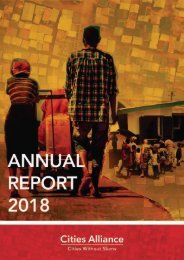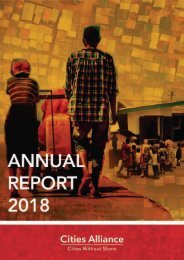You also want an ePaper? Increase the reach of your titles
YUMPU automatically turns print PDFs into web optimized ePapers that Google loves.
Two of the projects undertaken through the JWP closed in <strong>2018</strong>: The Urban<br />
Community Resilience Assessment (UCRA), and a second undertaken by C40<br />
on city climate action planning. Two new projects were launched, one that looks<br />
at indicators and data to measure sustainable, resilient cities and a second on<br />
adaptation diplomacy.<br />
I was reassured by<br />
atmospheric and<br />
physical scientists<br />
clearly stating that<br />
informality will be<br />
front and centre of<br />
the global research<br />
agenda that is<br />
being developed.<br />
- <strong>Cities</strong> <strong>Alliance</strong> Urban<br />
Environment Specialist<br />
Julie Greenwalt<br />
BRINGING INFORMALITY INTO THE DISCUSSION AT THE<br />
CITIESIPCC CITIES AND CLIMATE CHANGE CONFERENCE<br />
In March <strong>2018</strong>, <strong>Cities</strong> <strong>Alliance</strong> coorganised the <strong>Cities</strong>IPCC <strong>Cities</strong> and Climate<br />
Change Science Conference, which brought together scientists, city representatives,<br />
and urban practitioners for the first time to discuss cities and climate change and to<br />
inspire new research.<br />
As a partner and co-sponsor, <strong>Cities</strong> <strong>Alliance</strong> played an important role in building the<br />
partnership for the conference as well as organising and promoting it.<br />
On a substantive level, <strong>Cities</strong> <strong>Alliance</strong> strongly advocated addressing informality<br />
and urban poverty at the event. <strong>Cities</strong> <strong>Alliance</strong> also stressed the message that any<br />
global research agenda on cities and climate change must be inclusive of all types<br />
of cities, especially emphasising secondary cities and the growing cities of the<br />
global south, which were well represented.<br />
<strong>Cities</strong> <strong>Alliance</strong>'s message on informality and informal settlements as a necessary<br />
part of research and action moving forward was resoundingly heard. The view of<br />
informality as an important issue when addressing climate change in cities was<br />
visible throughout the conference and in all the plenary sessions.<br />
The main outcome of <strong>Cities</strong>IPCC was the Research and Action Agenda on <strong>Cities</strong><br />
and Climate Change. For more about the Agenda, and two other major global<br />
climate change events that the <strong>Cities</strong> <strong>Alliance</strong> was involved with, see Box 6.<br />
PROJECTS<br />
Urban Community Resilience Assessments (UCRA)<br />
<strong>Cities</strong> <strong>Alliance</strong> provided US $200,000 in funding to the World Resources Institute<br />
(WRI) to work on UCRAs in three cities: Rio de Janeiro, Brazil; Surat, India; and<br />
Semarang, Indonesia. WRI worked closely with 100RC and SDI on the project, which<br />
closed in <strong>2018</strong>.<br />
Developed by WRI with input from community and city leaders, the UCRA is a<br />
tool that takes planning for resilience to the neighbourhood level. This is a new<br />
approach for resilience, which is usually assessed at the city level. It is also an<br />
important one, as there can be big differences in how various neighbourhoods<br />
within a city experience risk.<br />
For example, in Semarang, the project found that three neighbourhoods in the<br />
city faced three different risks – sea level rise, inland flooding, and erosion – and<br />
assessed the vulnerabilities and capacities accordingly.<br />
In Surat, the project looked at an older slum neighbourhood that was at least 12<br />
years old, as well as a recently established slum. It found that the vulnerabilities are<br />
different; social cohesion was better in the older slums, but the infrastructure was<br />
much worse, meaning that the neighbourhood had greater resilience on the social<br />
side and less on the physical side.<br />
The project also recognised that cities are not the same across the board, and that<br />
solutions can be found related to what people have available. For example, in Rio,<br />
86 per cent of people have smart phones, so they can be used to notify residents in<br />
case of a disaster or weather-related risk. In Semarang, people still use drums as an<br />
alert system.<br />
42 <strong>Cities</strong> <strong>Alliance</strong>




